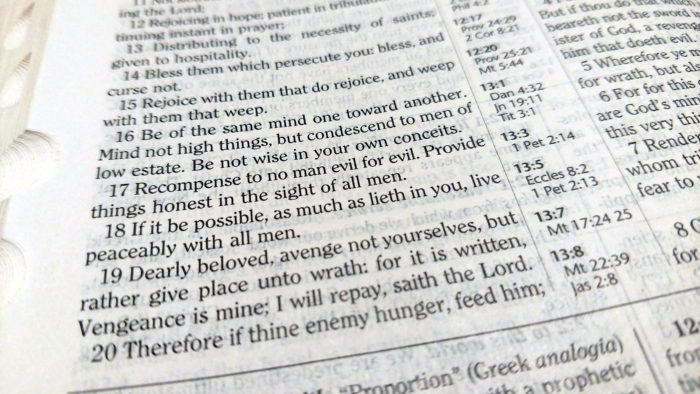Should Christian Abuse Victims Automatically ‘Forgive’ Offenders?
What stories do God’s people accidentally believe about the responsibilities of Christian abuse victims?
Unfortunately, many of these often-unspoken “stories” are based on false assumptions and and false doctrines.
Under false assumptions, we might list, “Sexual/power abuse isn’t a problem in (non-Catholic) churches.”
Under false doctrines, we might list, “Christian abuse victims ought automatically to ‘forgive’ their offenders.”
Either of these wounds Christ’s people and makes Christian abuse victims suffer all over again.
The false assumption is, at best, naive. But when Christian leaders utter that false teaching, they—despite any good intentions—make a mockery of God’s justice.
Even if the offenders have not repented and will not repent.
Even if it means the offenders will go on to abuse others.
And yes, even if it means the church covers up the offense and will not follow civil law.
False ‘forgiveness’
Of course, Christians have spent much blog-ink about the Houston Chronicle series about the latest such rash of abuses, cover-ups, and ignorance. Christian leaders have come forward and (rightfully) indicated their previous naivete, and failures, about this problem. Others talk about the challenges of particular church organizations, or the possible need to share more news about sex offenders who attempt “ministry.”
But when I read the first article, its repetition of the term “forgive” kept leaping out to me.
In all, since 1998, roughly 380 Southern Baptist church leaders and volunteers have faced allegations of sexual misconduct, the newspapers found. That includes those who were convicted, credibly accused and successfully sued, and those who confessed or resigned. More of them worked in Texas than in any other state.1
They left behind more than 700 victims, many of them shunned by their churches, left to themselves to rebuild their lives. Some were urged to forgive their abusers or to get abortions.2
[Abuse victim David] Pittman won’t soon forgive those who have offered prayers but taken no action. He only recently stopped hating God.3
When [abuse victim Debbie] Vasquez became pregnant, she said, leaders of her church forced her to stand in front of the congregation and ask for forgiveness without saying who had fathered the child.4
“Forgiveness is up to you alone,” general counsel Derek Gaubatz wrote in one 2007 email. “It involves a decision by you to forgive the other person of the wrongs done to you, just as Christ has forgiven you.”5
Christians must be careful how we define ‘forgiveness.’6
Here I must be very careful. I’ll also acknowledge that early feedback to this article included hearty disagreement with this concept. I’ll choose to proceed this way.
When Christian A accuses Christian B of abuse, others often give two responses.
Response One (Vengeance) says, “What an evil person. Never forgive him.” Some Christians may imply that the accused is outside God’s grace, or will go to Hell. (Pagans—or Christians who behave like pagans—do even worse then they gather and say things like, “Let’s ruin the accused person’s career and send him death threats over Twitter.”)
Response Two (Cheap Grace) says, “You need to forgive him immediately. Then you act like the sin never happened. This is because ‘love keeps no record of wrongs,’ and also, ‘Jesus said to forgive anyone seventy times seven.’ To do otherwise denies grace.”
I suggest that both these responses show extreme notions of cheap condemnation or cheap grace. Both responses also fail to capture the complexity of the biblical picture.
This fact also further complicate the picture: Christians often use the word “forgiveness” as a shorthand to describe several biblical concepts. These include the concepts of:
- Fighting the urge to become bitter or resentful;
- Fighting the urge to slander and take revenge on the offender;
- Reflecting that God in his grace has saved us from the chiefmost offense of prideful idolatry against him;
- Overlooking the offense of a brother, which means someone (perhaps a family member) in otherwise good relationship with us, who has a besetting sin that he’s already fighting
- Leaving the offense to God (Romans 12:19) and trusting him to avenge the wrong.
Here is a hard yet biblical saying: If victims of sinful abuse don’t want anything to do with these biblical ideas, then they’re in the wrong. They must consider “forgiving” this abuse, and healing to a point of wanting to offer this forgiveness. There is no room for the Christian to harbor resentment and choose the way of vengeance, either against an abusive nonbeliever or a believer who falls into abusiveness.7
Therefore, insisting “I’ll never forgive him” is not an option for the Christian. People who have stated this may fall to the Dark Side very quickly. According to Jesus, they imperil their own claim to live in light of God’s forgiveness of them (Matt. 6: 14–15).
Real forgiveness requires repentance—as God requires from us.
However, I do not believe that Christians should use the word “forgiveness” to refer to this biblical choice of rejecting vengeance and only wanting to forgive offenders. I don’t say this only because the word “forgive” has been used so often, along with “… and forget,” to silence victims and make them feel terrible for being wounded. I say this because biblically, the word forgiveness describes, as Chris Brauns says:
a commitment by the offended to pardon graciously the repentant from moral liability and to be reconciled to that person, although not all consequences are necessarily eliminated.8
Among Christians, this real forgiveness is always a mutual arrangement between offender and victim. And it will always leads to actual reconciliation, if not in the present day, then in the future after Jesus returns to make all things new.
Scripture, however, never calls us to “forgive” a person who has not repented.
This does not contradict Christ’s insistence that we forgive our brothers “seventy-seven times,” that is, offering unlimited forgiveness. (Most recall Christ’s words from Matt. 18: 21–22, but see the parallel text in Luke 17: 3–4, in which it’s clear Jesus is talking about situations in which the offending brother is first offering repentance.)
Nor does this contradict the Bible’s assurance—which many Christians believe—that any Christian is eternally secure. God’s word assures us that “no one can snatch” someone out of Christ’s hand (John 10: 28–29). Yes, that’s true, and yet we cannot ignore biblical warnings such as “No one born of God makes a practice of sinning” (1 John 3: 8–9). The Bible also teaches that real faith will inevitably show the fruit of good works (Eph. 2: 8–10), and that people who have “tasted the heavenly gift” can fall away (Hebrews 6: 4–8). Such warnings are part of the way God corrects and preserves his people, and cheap grace would get in the way of that.
In fact, this is affirmed by the very biblical teaching that God himself does not forgive people who do not repent. Hell is not full of forgiven people who simply refused to repent after God forgave them. (The very fact that Jesus said the Father will not forgive people who don’t forgive [Matt. 6: 14–15] shows that God does not forgive everyone—and that no Christian is outside God’s warnings about holiness.)
This is also affirmed by biblical teachings that reflect human frustration with power-abusers who get away with it. See the imprecatory Psalms, or Revelation 6:10:
They cried out with a loud voice, “O Sovereign Lord, holy and true, how long before you will judge and avenge our blood on those who dwell on the earth?”9
We can’t forgive unrepentant abusers; instead, we ‘leave it to the wrath of God.’
Yes, Scripture calls on us to be willing to forgive and to love our enemies. But loving enemies does not mean we gloss over their pattern of offenses against others, or even ourselves. By God’s standards (and often by the civil-law standards of our own regions, which I haven’t even touched on in this piece) we must confront the behavior. And if the person does not repent, we cannot (yet) properly forgive him.
Every time I contend for this view, someone presumes I’m automatically excusing grudges or bitterness, or justifying the person who abuses this truth to withhold a willingness to forgive an enemy. Not so. I’m simply saying we ought to use words properly, as God does.
And God has given us a great phrase to use for what we mean by “letting go of the offense.”
Instead of the word forgiveness (which, again, means an exchange between two willing parties), Paul says leave it. But finish the apostle Paul’s sentence: “Leave it to the wrath of God” (Romans 12:19). He does not say this is merely a feeling, or even a personal choice. He says this is based on the entirely practical truth that we trust God as the avenger. If your enemy is a Christian who refused to repent, God will discipline him. If your enemy turns out to have been a fake Christian, God will avenge the wrong and punish this enemy for eternity.

“Vengeance is mine; I will repay, saith the Lord” (Romans 12:19, KJV).
If I’ve been abused, I ought to want to forgive the abuser as soon as possible. But this is not simply a case of offense between brothers, spouses, or church members. Instead, this is a case of egregious sin, when one professing Christian for years has shown a pattern of acting more like the devil than like a true follower of Jesus.
At the very least, such a person needs to demonstrate true willingness to repent, which will require facing consequences (including potential loss of leadership positions and careers).10 The rewards, however, will be great indeed. He will have received real forgiveness (all the better if it’s nearly instant) from the persons he has wronged. That pattern of sin will no longer interfere with his relationship with God and claim to faith.
In any case, victims of abuse, and those who love them, must cling to the gospel, in which Jesus forgives people who repent. Don’t let people imply you must be more spiritual than God. But pray hard and train hard so you can forgive the offender as soon as possible. Meanwhile, try to leave it—the offense—to God, and find healing not through fake “forgiveness” but because you know the chief Avenger.
- Robert Downen, Lise Olsen, and John Tedesco. “Abuse of Faith: 20 years, 700 victims: Southern Baptist sexual abuse spreads as leaders resist reforms,” The Houston Chronicle, Feb. 10, 2019. ↩
- Ibid. ↩
- Ibid. ↩
- Ibid. ↩
- Ibid. ↩
- This article’s remainder is echoed from the section “Reconsider whether victims must forgive the accused” from my article “Twelve Responses to Abuse Accusations in Christian Conferences, part 1,” Speculative Faith, Sept. 21, 2018. ↩
- Remember that many of our most famous fantastical stories intentionally warn us against the dangers of vengeance, which will inevitably lead us to the Dark Side. ↩
- Chris Brauns, Unpacking Forgiveness, page 72. For more about biblical forgiveness, and its differences from common “therapeutic” notions of forgiveness, Brauns’s book is an excellent resource. Pastor and author Kevin DeYoung also summarizes this book, with Brauns, in this free article. ↩
- Revelation 6:10. Note that these saints are in heaven, unable to sin, and yet they carry a fierce and holy desire for God to avenge their own deaths. No one is insisting these Christians forgive their offenders. ↩
- Half-apologies, or apologies for single offenses when the abuser has actually committed a pattern of grooming and other nasty actions, don’t count. Crucial here is the role of the local church to whom the offender ought to be held accountable. Of course, many churches have no idea how to handle this, and some have enabled abusive leaders. But all this is even messier without churches. ↩



















I am a victim of child abuse that has been a part of my adult disability. I am no contact by choice. I have not been able to confidently say I forgive my mom, but I do have a willingness to forgive her. I’ve been praying for her salvation.
Thank you for writing this as it gave me a lot of peace knowing I’m ok where I am at and providing scripture to back it up. Thanking God for you.
Such a blessing to read this, thank you. Also a victim of chronic abuse from my mother, I have forgiven her untold times though she never repented, on the contrary the severe abuse kept getting and is getting worse. Am relocating very soon Lord willing and will go no contact for the sake of my spiritual and mental health, all other options haven’t worked.
After the recent discourse about whether a man should forgive his son’s murderer, I’m not surprised to see a few more eyes on this older article. Thank you for your comment, Sophia!
Yet I am so sorry to hear about that situation. Tonight I will pray for you and this situation.
I think it’s wonderful, and very Christlike, to want so badly to forgive someone that you err on the side of “forgiving” a person who hasn’t repented. Surely our wonderful Savior will reward this posture of mercy toward the offender. I love the Apostle Paul’s command that is so challenging but also realistic: “If possible, so far as it depends on you, live peaceably with all” (Romans 12:18). He doesn’t go into detail, but leaves open the possibility that some situations are outside our control and we can’t actually live at peace with some folks. Sin is that terrible. It ruins relationships and poisons the human soul.
May the same holy God Who forgives His adopted sons and daughters forgive your mother, which also means bringing her to repentance. And then, in His good timing, may He arrange a sincere repentance and forgiveness between the both of you that leads to healing—if not in this world, then in the world to come.